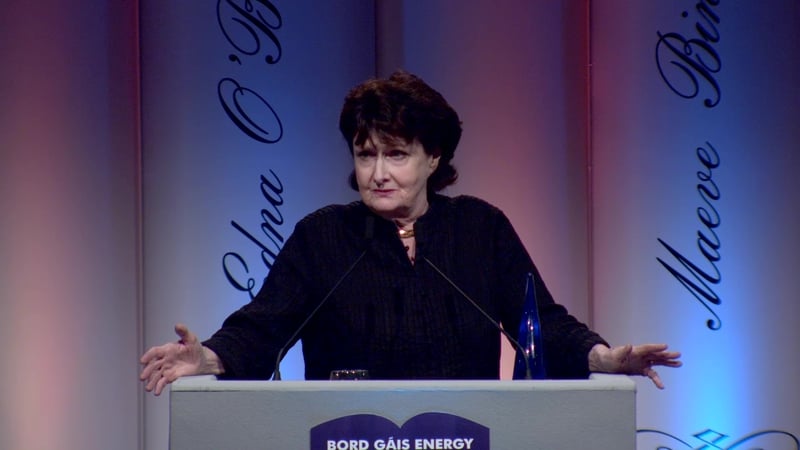
Irish poet Eavan Boland has died at the age of 75.
She died last week at her home in Dublin following a stroke.
Born in Dublin in 1944, Eavan Boland became known as one of the foremost female voices in Irish literature.
Her first collection of poems was published when she was still a student and she went on to have a long career as a poet, editor and teacher.
She was known for documenting women's lives, including their domestic lives, and her work also looked at the role of women in Irish history and culture.
She received the Lifetime Achievement Award at the Irish Book Awards in 2017 for what was described as her art, her eloquence and her stalwart advocacy for poetry.
In 2015, Eavan Boland's poem 'Quarantine’ was shortlisted in the Poem for Ireland competition on RTÉ.
In recent years, she divided her time between Ireland the US, and was Professor of English and director of the creative writing programme at Stanford University.
President Michael D Higgins described her as an internationally acclaimed poet and distinguished academic and author. He added: "It was her particular gift to reveal the beauty in the ordinary.
"Over the years, through her poetry, critical work and teaching she displayed an extraordinary ability to invoke Irish landscapes, myth and everyday experience.
"She became one of the pre-eminent voices in Irish literature, noted for the high standard she sought and achieved.
"The revealing of a hidden Ireland, in terms of what was suffered, neglected, evaded, given insufficient credit, is a part of her achievement."
President Higgins said she would be missed by all who read her work and those who studied under her.
He added: "To all of us who had the privilege of knowing her, her passing is a source of great loss and sadness.
"To her husband Kevin, their daughters and the members of her extended family, her colleagues in poetry and her wide circle of friends, Sabina and I send our deepest condolences."
Eviction
By Eavan Boland
Back from Dublin, my grandmother
finds an eviction notice on her door.
Now she is in court for rent arrears.
The lawyers are amused.
These are the Petty Sessions,
this is Drogheda, this is the Bank Holiday.
Their comments fill a column in the newspaper.
Was the notice well served?
Was it served at all?
Is she a weekly or a monthly tenant?
In which one of the plaintiffs’ rent books
is she registered?
The case comes to an end, is dismissed.
Leaving behind the autumn evening.
Leaving behind the room she entered.
Leaving behind the reason I have always
resisted history.
A woman leaves a courtroom in tears.
A nation is rising to the light.
History notes the second, not the first.
Nor does it know the answer as to why
on a winter evening
in a modern Ireland
I linger over the page of the Drogheda
Argus and Leinster Journal, 1904,
knowing as I do that my attention has
no agency, none at all. Nor my rage.
No comments:
Post a Comment